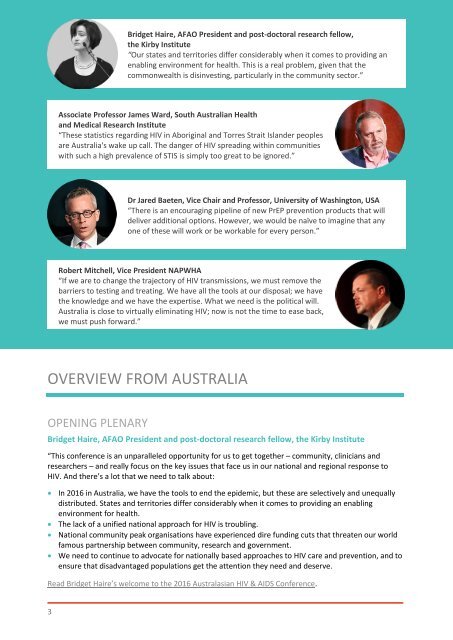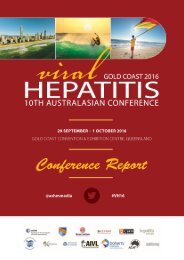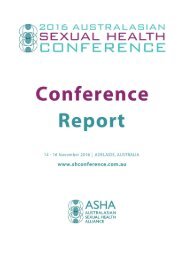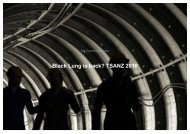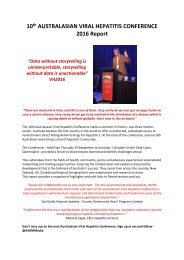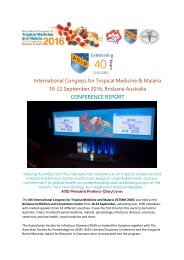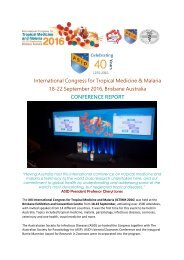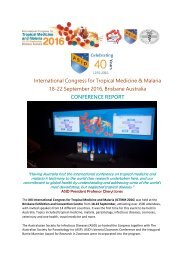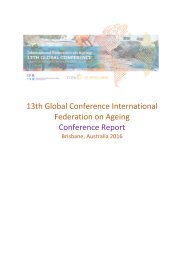AUSTRALASIAN HIV CONF REPORT 2016_FINAL
The Australasian HIV & AIDS Conference, run by ASHM, presents new and innovative research from across the Australasian HIV sector. Delegates include researchers, clinicians, policy makers, community organisations and activists. This 2016 Conference Report provides a collection of key learnings, with links to abstracts and presentations.
The Australasian HIV & AIDS Conference, run by ASHM, presents new and innovative research from across the Australasian HIV sector. Delegates include researchers, clinicians, policy makers, community organisations and activists. This 2016 Conference Report provides a collection of key learnings, with links to abstracts and presentations.
Create successful ePaper yourself
Turn your PDF publications into a flip-book with our unique Google optimized e-Paper software.
Bridget Haire, AFAO President and post-doctoral research fellow,<br />
the Kirby Institute<br />
“Our states and territories differ considerably when it comes to providing an<br />
enabling environment for health. This is a real problem, given that the<br />
commonwealth is disinvesting, particularly in the community sector.”<br />
Associate Professor James Ward, South Australian Health<br />
and Medical Research Institute<br />
“These statistics regarding <strong>HIV</strong> in Aboriginal and Torres Strait Islander peoples<br />
are Australia's wake up call. The danger of <strong>HIV</strong> spreading within communities<br />
with such a high prevalence of STIS is simply too great to be ignored.”<br />
Dr Jared Baeten, Vice Chair and Professor, University of Washington, USA<br />
“There is an encouraging pipeline of new PrEP prevention products that will<br />
deliver additional options. However, we would be naïve to imagine that any<br />
one of these will work or be workable for every person.”<br />
Robert Mitchell, Vice President NAPWHA<br />
“If we are to change the trajectory of <strong>HIV</strong> transmissions, we must remove the<br />
barriers to testing and treating. We have all the tools at our disposal; we have<br />
the knowledge and we have the expertise. What we need is the political will.<br />
Australia is close to virtually eliminating <strong>HIV</strong>; now is not the time to ease back,<br />
we must push forward.”<br />
OVERVIEW FROM AUSTRALIA<br />
OPENING PLENARY<br />
Bridget Haire, AFAO President and post-doctoral research fellow, the Kirby Institute<br />
“This conference is an unparalleled opportunity for us to get together – community, clinicians and<br />
researchers – and really focus on the key issues that face us in our national and regional response to<br />
<strong>HIV</strong>. And there’s a lot that we need to talk about:<br />
In <strong>2016</strong> in Australia, we have the tools to end the epidemic, but these are selectively and unequally<br />
distributed. States and territories differ considerably when it comes to providing an enabling<br />
environment for health.<br />
The lack of a unified national approach for <strong>HIV</strong> is troubling.<br />
National community peak organisations have experienced dire funding cuts that threaten our world<br />
famous partnership between community, research and government.<br />
We need to continue to advocate for nationally based approaches to <strong>HIV</strong> care and prevention, and to<br />
ensure that disadvantaged populations get the attention they need and deserve.<br />
Read Bridget Haire’s welcome to the <strong>2016</strong> Australasian <strong>HIV</strong> & AIDS Conference.<br />
3


